In new film SABBATH, Martin Doblmeier ’73, ’09Hon. argues that rest requires trust
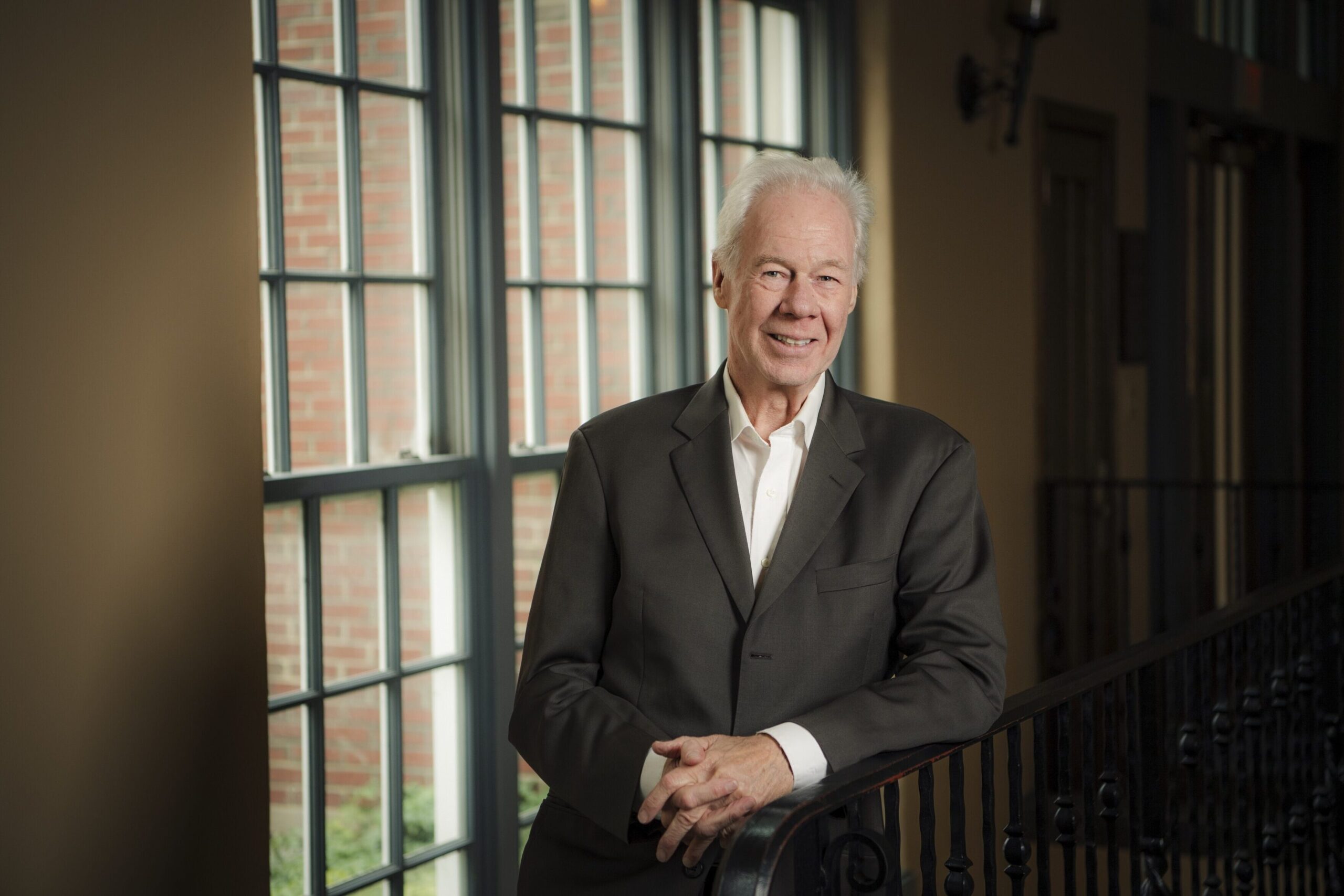
In new film SABBATH, Martin Doblmeier ’73, ’09Hon. argues that rest requires trust
By Michael Hagan ’15, ’19G
“Observing the sabbath takes trust,” said filmmaker Martin Doblmeier ’73, ’09Hon. “You must be able to trust for one day that you’ve done enough, you have enough, and that you are enough.”
SABBATH is the latest documentary written and directed by Doblmeier and produced by Journey Films. Presented by Maryland Public Television and distributed by American Public Television, it is the product of 18 months of creative and technical labor that included 30 days of on-location filming in 10 states including California, Massachusetts, Mississippi, New Jersey, and North Carolina. Funding was provided by Lilly Endowment Inc. among other foundations and individuals. Doblmeier participated in a panel discussion about the film during a visit to Providence College in October and also met with students in a film class.
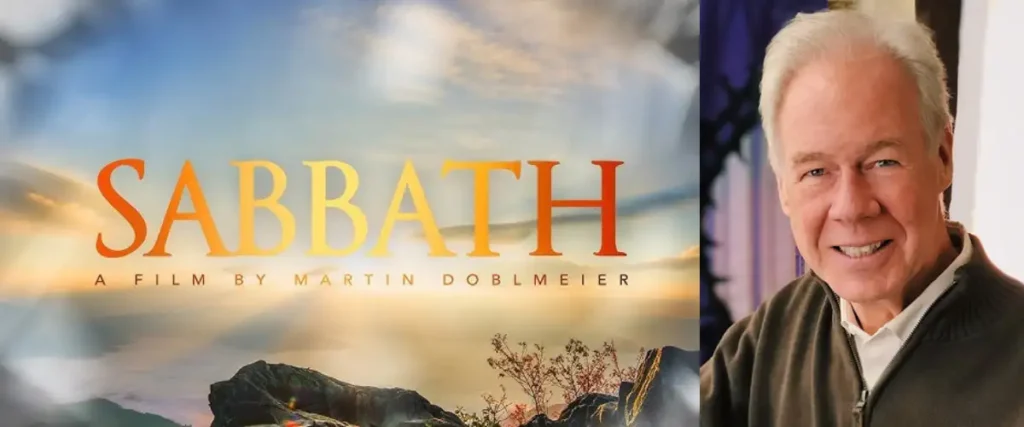
Doblmeier is the president and founder of Journey Films, a small but prolific production company whose documentaries explore topics of religion, faith, and spirituality. The company’s more than 35 productions have aired on PBS, ABC, NBC, and the BBC. Their honors include three regional Emmys, prizes from numerous film festivals, and 10 Gabriel Awards from the Catholic Media Association.
In SABBATH, Doblmeier weaves short stories from religious and secular perspectives in a two-hour case for the timeless relevance of one of the world’s oldest and most enduring spiritual practices — maintaining the seventh day as a day of rest. It considers evidence from medicine and psychology that a regular practice of rest is an important aspect of wellness. It also highlights the relationship of sabbath rest to ecology and the development of agriculture — how regular cessation of human labor facilitates rest and renewal for creation.
Doblmeier was inspired to make the film through a previous project on the life and teachings of Abraham Joshua Heschel, a Polish American rabbi and civil rights activist whose 1951 book, The Sabbath: Its Meaning for Modern Man, argued that the Jewish practice of Shabbat prioritizes and sanctifies time that is often a casualty in humanity’s efforts to marshal material and conquer space. In an era of 24-hour technological access and exponential growth of digital spaces more than 70 years after Heschel’s study, Doblmeier believes that intentional rest is a necessary but too often lost practice in “a stressed-out, modern world.”
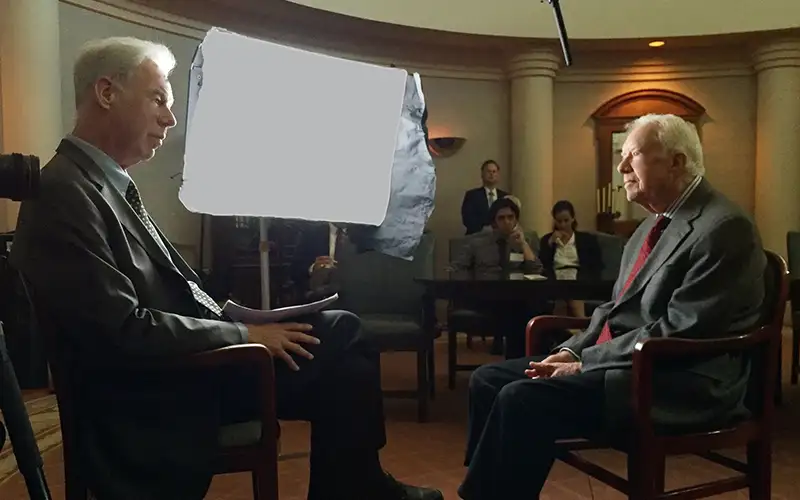
A kind of sabbath observance is critical to Doblmeier’s own work. He believes that “nothing is more useless than a half-made film,” but that with completion must come rest and separation from a project.
“Filmmaking is the kind of work that stays with you and keeps you up at night. When I complete a film, I am done. I must let go. It’s the only way I can keep going. We have to learn to set things down and walk away,” he said.
Doblmeier arrived at Providence College in 1969. He was born in Queens, New York, and lived in Virginia before his family relocated to Rhode Island. He attended Bishop Hendricken High School in Warwick. Mere days before new student orientation in Providence, Doblmeier attended the historic Woodstock music festival in Bethel, New York.
“It’s remarkable how much the world has changed since I first arrived at Providence College,” he said.
After graduating with a bachelor’s degree in religious studies, Doblmeier was a staff writer for the Providence Visitor newspaper (now the Rhode Island Catholic). In 1978, he enrolled at Boston University where he earned a master’s degree in broadcast journalism.
After graduate school, Doblmeier created the television series Real to Reel as part of a media campaign by the United States Conference of Catholic Bishops, who were responding to the call for a “new evangelization” arising from the documents of the Second Vatican Council and advocated by Pope Saint John Paul II. The program’s first episode profiled Nobel Prize-winning humanitarian Mother Teresa, who was canonized Saint Teresa of Calcutta in 2016. The nationally syndicated series is still produced today by the Catholic Communications Corporation of the Diocese of Springfield, Massachusetts.
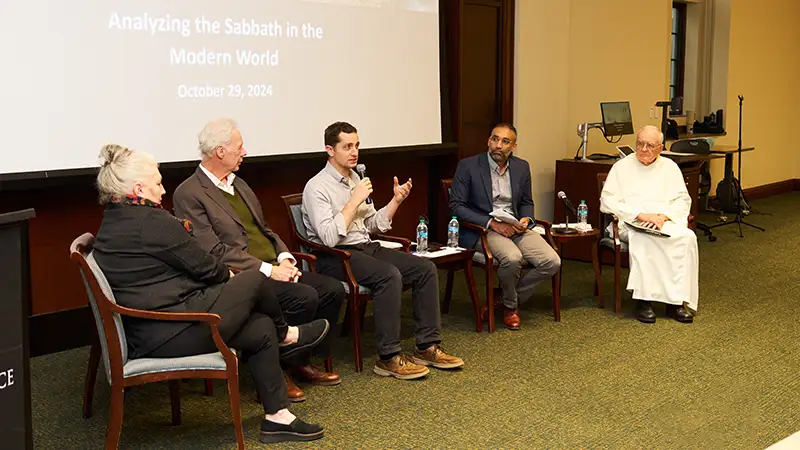
In 1983, Doblmeier founded Journey Films, and devoted any personal savings he could spare to the company’s early projects.
“It was risky, but we were doing unique work others had not done before. I knew that if we could produce a few signature films, people would fund our future projects,” he said.
Early Journey Films projects included documentaries on the spiritual nature of creativity, the Taizé ecumenical Christian monastic community in France, and the Corrymeela Community in Belfast that aided those who suffered in the Northern Irish conflict of the 20th century. A more recent project, An American Conscience: The Reinhold Niebuhr Story, included interviews with public theologian and activist Cornel West, theological ethicist Stanley Hauerwas, and President Jimmy Carter. For a film on Dorothy Day, the founder of the Catholic Worker Movement, Doblmeier interviewed two of Day’s granddaughters and Emmy Award-winner Martin Sheen, who encountered Day and the Catholic Worker community in New York City as a struggling young actor.
At the panel discussion held in the Ruane Center for the Humanities, Doblmeier was joined by Benny Bar-Lavi, Ph.D., the college’s inaugural Scholar-in-Residence in Jewish Studies and Jewish-Christian Relations; Bilal Ibrahim, Ph.D., assistant professor of global studies and scholar of Islamic intellectual history; and Rev. Thomas McCreesh, O.P. ’65, associate professor of theology specializing in Old Testament studies. Holly Taylor Coolman, Ph.D., assistant professor of theology, facilitated the discussion that included questions and responses from audience members. Coolman’s scholarly interests include Christian accounts of Judaism and Jewish-Christian relations.
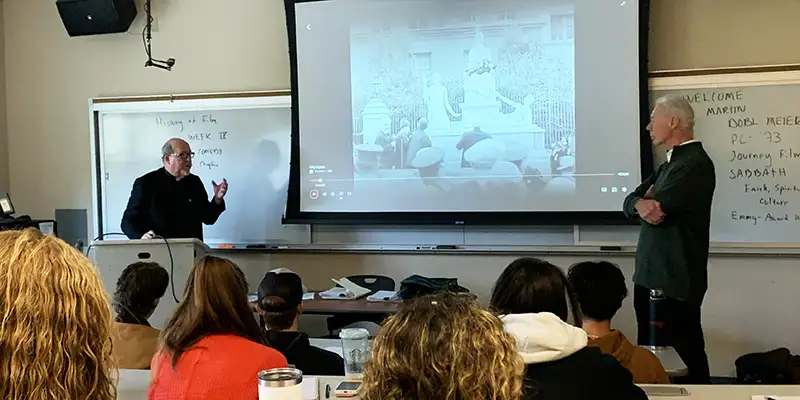
The morning before the panel discussion, Doblmeier visited a History of Film course taught by Rev. Kenneth Gumbert, O.P., professor of film studies.
“I really ought to take this class,” Doblmeier said in a warm response to Father Gumbert’s brief introduction of the documentary film genre.
“I was just getting my feet wet in film when Martin was ascending,” Father Gumbert said.
Father Gumbert is a documentary filmmaker who has assisted with several projects, including the 1994 crime drama Federal Hill by Michael Corrente, which is set in Providence. The cast and crew of Federal Hill affectionately called Father Gumbert “padre to the stars.”
If your parents ever tell you that film studies won’t help your career,
have them call me.Martin Doblmeier, ’73, ’09Hon.
There was no film studies program at Providence College when Doblmeier was a student. Nonetheless, “This is where my interests were incubated, where I put together the topics and ideas I wanted to work with in my career,” he said. “I married the content I learned at Providence College to my later graduate studies in film.”
He recalled how difficult it was to access filmmaking equipment and supplies when he began studying the craft and encouraged students to utilize the sophisticated digital filmmaking equipment most carry in their pockets.
“In graduate school, I had to build rapport with the keepers of the equipment just to be able to borrow and use it. Nowadays, it won’t be long until somebody shoots a Best Picture on a phone,” he said.
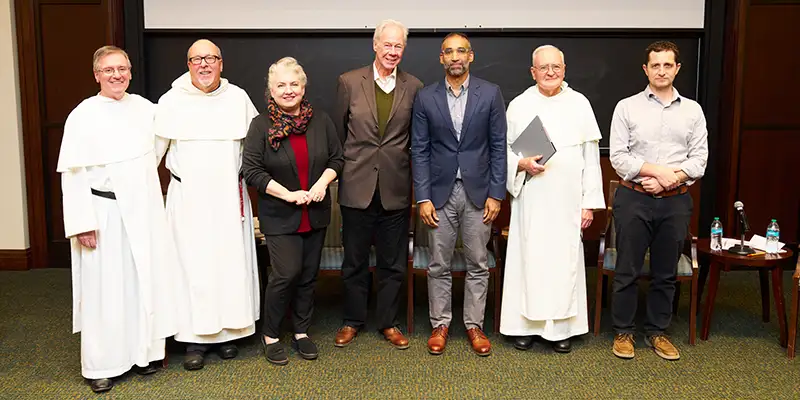
Doblmeier reminded students that filmmaking and video production are fields that have only grown in terms of demand and opportunity. He pointed out that while the entertainment industry offers professional opportunities for filmmakers, most new video production jobs are in the broader commercial sector.
“If your parents ever tell you that film studies won’t help your career, have them call me,” Doblmeier said. “It is hard work, but there is so much demand for well-conceived, smartly directed video.”
Doblmeier most enjoys the social and collaborative dimension of filmmaking. It’s not just telling stories, “It’s telling stories with people.”
“Film is one of the ultimate collaborative exercises, much like putting a band together. Filmmakers build relationships with people of like mind and similar interests. These friendships are much more than a perk; they are critical to the work itself,” he said.





